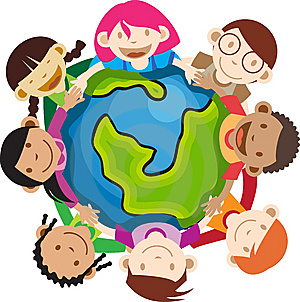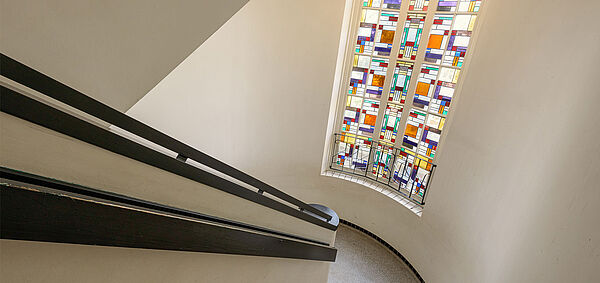Europa School in English
What is the Europa School?
The Europa School is a primary school located in Amsterdam Zuid (the southern district of Amsterdam). The school was founded in 1992 and currently has roughly 400 pupils. An international orientation was central to the design of the original curriculum of the school and that remains true today. Besides the regular primary education, from their very first year at the Europa School all pupils receive lessons in a different European language and culture: English, Spanish or French. This makes the Europa School unique.
Who is the Europa School for?
The Europa School has a very diverse pupil population. At least 60% of the pupils have at least one parent whose mother tongue is not Dutch. There are no less than fifty nationalities in the school with twenty-six different native languages. The varied composition of the school population means the school truly reflects the population of Amsterdam. Many parents opt for the Europa School because of its unique educational concept and international character, and the fact that it remains a Dutch school where lessons are taught in Dutch. Unlike international schools, the pupil population of the Europa School remains stable. The pupils live not only in the immediate vicinity of the school, but also travel to the school from more distant neighborhoods.
Which educational concept does the Europa School use?
The Europa School uses modern lesson materials and teaching methods for both Maths and Dutch. For all other subjects we use the DaVinci Method, an inquiry based learning method designed to develop an interdisciplinary, academic attitude.
What is DaVinci?
Early language learning
What is meant by early language learning (VVTO) and how does it work at the Europa School?
From the age of four, pupils at the Europa School are taught English, French or Spanish. Parents can indicate a preference for which language their child will be taught when they register their child at the school. Lessons are not taught by the children’s own class teacher but by native speakers. The class is divided up into groups which then go together to their English, French or Spanish language teacher for their lesson. The pupils receive foreign language lessons two or three mornings a week and each lesson lasts either forty-five minutes or an hour. The VVTO lessons compliment the DaVinci themes as much as possible.
Please note: the language chosen must NOT be a language spoken at home by the parents; no mother tongue education is provided.
In group 8 (the last year of primary school) pupils sit an internationally recognised exam in their chosen foreign language, each at their own level. In accordance with the standards of the Common European Framework this is likely to be A1 or A2, sometimes B1 and occasionally even C1. As an example, a pupil will then be able to hold a (telephone) conversation, understand the key points of a news item, tell other people about themselves or their family, understand simple texts, and read books. During the language lessons attention is also given to the culture of the country. By acquainting young people with other languages and cultures, we teach them to communicate with people who are different to them.

Can children who do not speak Dutch attend the Europa School?
Age 4/5
Children who do not speak Dutch and are younger than 6 (gr 1-2) can attend the Europaschool. They will join one of the infant classes and attend the Dutch support class as long as needed. Only after achieving the required level of Dutch they will shift to one of the other foreign languages.
Age 6/12
Children older than 6 (group 3-8) who do not speak Dutch can only attend the Europaschool if they have recently arrived in the Netherlands (less than one year) and do not have a Dutch passport. The Europa School has a special class for these “newcomers”.
Pupils that join this class receive lessons in various subjects but the focus is on learning Dutch. Once their Dutch is of a certain standard they move across into one of the regular groups.
All pupils who are placed in the Newcomers Class are also given a place in one of the regular age-group classes at the Europa School. This means the children can join the rest of their group and participate in joint activities from the very beginning. For example, children from the Newcomers Class join their age-group at break times and for PE lessons. As soon as their language skills allow, they also join in other lessons. Pupils who join their age-group class full-time (after a year in a Newcomers Class), but who still need additional assistance, are given extra support by a specialist teacher.
If you're interested in a place for non dutch speaking children (age 4+) or want to know more you can send an e-mail to the following address: interessenk@europaschool.espritscholen.nl
What is the registration process for the Europa School?
Registration
Because the Europa School has a specific and unique education concept, its catchment area is the whole of Amsterdam. We want the parents of children who attend our school to have consciously chosen for and embraced our educational concept, even if they do not live in the immediate vicinity of the school. In practice, about two-thirds of the pupils of the Europa School live in Amsterdam Zuid, or in the immediately adjacent neighbourhoods; a third come from further afield.
Children can be registered with the school from their third birthday. The order in which children are registered does not affect placement.
Amsterdam has a central placement system which the Europa School is part of. Once a child is approaching three years old, the Amsterdam municipality will contact the parents and ask them to register their child in the school placement system. At the same time, the parents are provided with a list of schools whose catchment area they live within. Parents are not obliged to choose a school from that list, but often have some degree of priority at those schools. Essentially, parents can choose from any primary school in Amsterdam - but the chances of getting their child a place at certain schools will be higher than at others. Parents are required to state their preferred choice of school and are advised to list as many schools as is reasonably possible.
The Europa School has a different priority system to that adopted by many of the other Amsterdam schools. We give priority to those children whose parents have named the Europa School as their preferred school, over children who simply happen to live within our post-code catchment area. In principle, we give priority to children who have the Europa School as their preferred school and who live within the post-code catchment area. We then give places to children who live outside the catchment area but whose parents have named the Europa School as their preferred choice. This usually results in the vast majority of children who have the Europa School as their preferred choice being given a place at the school.
Admission
If a pupil is given a place at the Europa School the parents will be invited for an intake interview with either the deputy or the head. Parents are asked to bring their child with them.
The purpose of this meeting is to make each other's acquaintance and to address any questions, either from the school or the parents, which need to be dealt with before a definitive placement can be made. The meeting also gives the school an opportunity to find out about any special learning or developmental needs which the child may have. This allows the school to address these as soon as possible after the child becomes a pupil at the school. The meeting is our opportunity to assess whether or not the Europa School can meet the needs of the child. Siblings of current pupils of the school go through the same intake interview procedure.
The intake interview is also the moment when we agree which foreign language the pupil is going to take.
Familiarisation period
Children in the Netherlands start attending school when they turn four. This means that children are joining the school throughout the school year, rather than as one of a group on a fixed date in the year. Shortly before a child’s fourth birthday they are invited to the school for two half-days to give them a chance to get to know the school. Once a child has had his/her fourth birthday and joins the school ‘for real’ he/she may continue to have a familiarisation period during which he/she only attends school in the mornings, or they may attend school full time from day one. What is appropriate for each individual child is decided in consultation with the class teacher.
The actual procedure is set out below:
- You attend an information morning for parents at the school. The dates for these events can be found on the school website. You can register to attend one of these mornings with the school secretary.
- You receive a school registration form from the municipality.
- You visit various primary schools in Amsterdam and decide which is your preferred school. Once you have decided which schools you wish to put on your list you fill in the school registration form. There are three fixed moments in the year when all the schools determine the allocation of places at their school to registered children.
- At the latest 3 months before your child turns 4 years old you will be told whether or not your child has been given a place at your preferred primary school.
- You will then be invited for an interview with someone at the school. This will usually be either the deputy head, or the head of the school.
Some children are given priority placement, for example:
If a brother or sister already attends the same school
If the child has attended an associated nursery school with a VVE indication.
If a parent is employed by the school.
The municipality's website has all the information about the registration process and the relevant dates for when allocation/placement will take place.

Lateral entry (zij-instroom)
For children who come to the Europa School from a different school (lateral entry), the procedure is different. The steps are as follows:
Parents send an email to the school in which they describe their child’s current situation.
If there is a place free in the relevant year group then the parents will be invited for a discussion with the deputy head about their placement request.
● If the parents consent, we contact the pupil’s old school in order to gain access to the pupil’s school portfolio and any other information which the school can share with us.
● The child will be invited to attend our school for a day.
● If necessary, the child will be asked to sit certain tests.
● If the decision is taken that placement will go ahead then a starting date will be agreed with the class teacher.
A correctly completed and signed registration form is necessary for all pupils (i.e. this includes those joining us from other schools) before they can receive a definitive placement at the Europa School.
If you're interested in our school and want to know more it's possible to attend one of our information afternoons. You can register by sending an e-mail to the following address: info@europaschool.espritscholen.nl
Information morning prospective parents English (10:00 - 11:00)
| Wednesday, 18 October, 2023 |
| Wednesday, 31 January, 2024 |
| Wednes, 29 May, 2024 |
